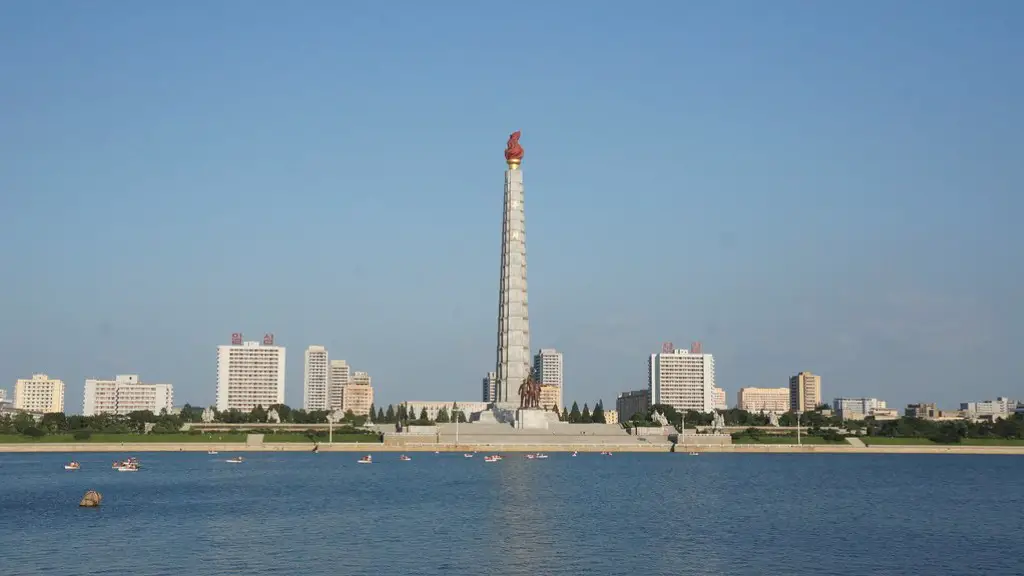When Did The US Declare War On North Korea?
The US and North Korea have a long history of an acrimonious relationship, with the two countries never having officially declared war on each other. Many would say the “war” has been simmering since the 1950s and the start of the Korean War, with no resolution having been found even to this day. The war, which officially ended when the armistice agreement was signed on July 27, 1953, resulted in a stalemate, with the conflict technically turning into a “ceaseless cold war”. While it is true that the US has never declared war on North Korea, the relationship between the two countries is far from friendly and the US continues to maintain stiff economic and trade sanctions against the North Korean government.
The easing of tensions between the US and North Korea have been episodic, with several false starts over the course of time. In the 1990s, some progress was made when the US and North Korea held talks on a formal peace treaty. During this period, the US also lifted some sanctions against North Korea to help promote its economy. However, the talks eventually fell apart, with the US citing North Korea’s failure to abide by agreements made at the table. This stalled any major diplomatic rapprochement between the two countries.
In recent years, there has been a real thaw in US-North Korea relations, with both countries engaging in talks towards a formal resolution of their decades-old animosity. In 2018, US President Donald Trump and North Korean leader Kim Jong-un met for the historic summit in Singapore, where the two leaders signed an agreement committing to work towards complete denuclearisation of the Korean Peninsula. The agreement marked the official start of a new era in the US-North Korean relationship.
While the current US-North Korean relationship is much more of a cordial one compared to the past decades, war is still a very real possibility. The US government has made it clear that it does not trust North Korea to keep its end of the agreements and continues to pressure the regime to demonstrate its commitment to peace and stability on the peninsula. It has also emphasised the importance of maintaining military readiness in the face of potential provocations from the North.
These developments demonstrate the fragile nature of the US-North Korea relationship and show that hostilities between the two nations could quickly escalate should either party feel threatened. Thankfully no shots have been fired yet, but the possibility of war has not been completely eliminated. As such, the US government has maintained its stance that it would not rule out the use of force in the event of further provocation from North Korea.
US Sanctions Against North Korea
The US has imposed a wide range of economic and trade sanctions against North Korea in an effort to pressure the regime to abandon its nuclear ambitions. The sanctions have included international bans on North Korean exports, restrictions on North Korean vessels and aircraft, and even a travel ban for North Korean government officials. The sanctions have been effective in curbing North Korea’s nuclear development, but have also taken their toll on the North Korean economy, with the World Bank estimating that the sanctions have cost the North Korean economy $2 billion in lost GDP.
The US government has made it clear that the sanctions are only in effect until North Korea takes tangible steps to rejoin the global mainstream and give up its nuclear weapons. The US has also made it clear that it would not lift the sanctions until a verifiable denuclearized status is achieved. As a result, the US-North Korea relationship remains largely dependent on the sanctions, with both sides needing to find a way to bridge the gap in order to build a lasting peace.
The US’s stance on sanctions underscores the importance of peaceful dialogue and diplomatic relations between the two countries. The US comprehensive economic sanctions simply cannot be seen as the only way to address the North Korean nuclear issue, and it has become increasingly clear that negotiations and mutual engagement are the only way forward. The sanctions put in place by the US are designed to be an impetus for the peaceful resolution of disputes and have shown to be effective in pushing North Korea towards greater engagement with the wider international community.
Tensions in the Region
The US’s relationship with North Korea is only one facet of the complex geopolitical situation in the region. The US has long been a staunch ally of South Korea, a country whose citizens remain divided over whether to engage in dialogue with the North or to maintain an aggressive stance against the Kim Jong-un regime. The relationship between South Korea and North Korea has been strained for years, and their respective leaders have yet to meet each other, much less sign an agreement to end the war between the two countries.
The US has maintained a policy of strategic patience with North Korea in the midst of rising tensions in the region. This policy of waiting and watching has helped cool down the situation on the Korean Peninsula and allowed for diplomatic channels to open between Washington and Pyongyang. This has been beneficial for the entire Korean Peninsula, as it has allowed for dialogue and diplomacy to take the place of increased tensions and possible military confrontation.
However, the US is still prepared to take military action if provoked. This is evidenced by the fact that the US maintains a sizable military presence in South Korea and Japan, two countries which are within striking distance of North Korea. This is an effort to show North Korea that the US stands ready to intervene in any possible conflict on the peninsula and wants to ensure stability in the region.
US Nuclear Policy
The US nuclear policy is central to any discussion of its relationship with North Korea. The US has long maintained a policy of using nuclear weapons only within the framework of its own national security interests. This policy has dampened fears of nuclear attack coming from North Korea. At the same time, the US has emphasised the importance of maintaining a credible nuclear deterrent in order to protect itself against any potential aggression from North Korea in the future.
The US also works closely with other countries to ensure its nuclear policy does not lead to a nuclear arms race. For example, it has entered into agreements with Russia to reduce both countries’ nuclear stockpiles and has been actively seeking international support for its extreme view of non-proliferation. The US has also taken steps to prevent nuclear weapons from falling into the hands of extremist organisations or rogue states.
The US has consistently reiterated that it has no aggressive intentions towards North Korea and wants to see the region become safer. At the same time, the US maintains its position that it cannot accept North Korea as a nuclear power and is determined to prevent it from becoming one. This dual-sided policy has been successful in maintaining a balance between the two countries and keeping tensions from escalating.
Conclusion
The US has never officially declared war on North Korea, but the two countries have had a long and acrimonious history. Despite these tensions, the US and North Korea have managed to maintain a dialogue and keep tensions from boiling over into military action. This is thanks in large part to the US economic sanctions, its nuclear policy, and its close ties to its regional allies. As long as the US and North Korea remain committed to a peaceful resolution of their differences, peace and stability in the region should remain.



